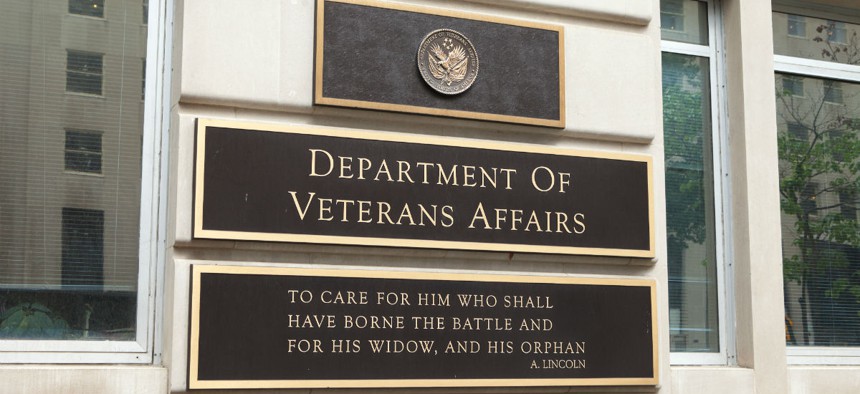
By Mark Van Scyoc / Shutterstock.com
Senate Intervenes on Behalf of IG After VA Questions the Watchdog's Authority
Senate votes 96-0 in favor of inspector general after VA's acting secretary told IG to pipe down.
The Senate this week unanimously intervened in a dispute between the Veterans Affairs Department and its inspector general, voting to tell the agency it cannot make any efforts to block the watchdog’s investigations.
The 96-0 vote came as an amendment to a VA spending bill and after a back-and-forth exchange of letters in which Peter O’Rourke, the department’s acting secretary, and Michael Missal, its inspector general, traded criticisms. The incident originated from an IG request to obtain records related to VA’s new Office of Accountability and Whistleblower Protection, which the department has refused to provide. Missal wrote a letter earlier this month to O’Rourke, who led the OAWP before taking over as acting secretary, saying he has been asking for the information for six months. He said VA’s failure to comply was unlawful under the 1978 Inspector General Act and the 2016 Inspector General Empowerment Act, which provide IGs with access to all agency records and documents.
O’Rourke responded by criticizing the IG’s office for asking for an overly broad set of documents that amounted to rolling access to all cases fielded by the whistleblower office, which was launched in 2017. In decidedly pointed terms, the acting secretary accused Missal’s office of “overreach” and abusing its authority.
“I am also troubled by OIG not performing its responsibilities in a fair and objective manner, which has caused significant harm to the reputation and performance of VA and its employees,” O’Rourke wrote.
O’Rourke argued the IG made accusations without evidence, leaned on improper techniques and ignored "exculpatory evidence that contradicts your chosen narrative.” He concluded his letter with a warning:
You also appear to misunderstand the independent nature of your role and operate as a completely unfettered autonomous agency. You are reminded that OIG is loosely tethered to VA and in your specific case as the VA inspector general, I am your immediate supervisor. You are directed to act accordingly.
While that claim is technically accurate, it appears to ignore the spirit of the law. The Council of the Inspectors General on Integrity and Efficiency, which provides oversight of and training for federal IGs, says on its website that the watchdogs are independent.
“While by law, IGs are under the general supervision of the agency head or deputy, neither the agency head nor the deputy can prevent or prohibit an IG from conducting an audit or investigation,” CIGIE said.
Some of O’Rourke’s complaints also seem to be disputed by the text of the 2016 IG Empowerment Act. It says IGs should “have timely access to all records, reports, audits, reviews, documents, papers, recommendations or other materials available.”
In a document prepared for transitioning agency heads in advance of the 2016 election, CIGIE further hammered home that point.
“OIGs are located within their agencies but must conduct their audits, investigations, evaluations and special reviews independently from their agencies. For example, agency heads may not prevent the IGs from initiating, carrying out, or completing any audit, evaluation, or investigation, except in limited circumstances,” the group wrote. “IGs must maintain their independence, in both reality and in appearance, to provide credible oversight.”
Missal noted similar points in a response letter to O’Rourke.
“Such language conflicts with the clear intent of the IG Act to ensure that the work of inspectors general is independent from an agency head,” Missal wrote. He added that case law and legislation has demonstrated the “general supervision” technically provided to agency heads over IGs is “extremely limited and does not permit any interference in OIG investigations.”
Former Rep. Jason Chaffetz, R-Utah, who authored the 2016 update to the IG law, predicted there would not be a member of Congress on either side of the aisle who would take O'Rourke's side.
"The acting secretary is acting like an idiot," said Chaffetz, the former chairman of the House Oversight and Government Reform Committee. "He's in for a rude awakening. The IG has every right to those documents."
Missal also said that all of his office’s investigations conform with CIGIE’s best practices and that the data from the whistleblower office was key for his investigations. OAWP is receiving 150-170 complaints per month, the office told the IG, few of which are being forwarded along. Missal sent a letter to Rep. Tim Walz, D-Minn., the top Democrat on the House Veterans' Affairs Committee, alerting him to the situation so “you may take whatever action you deem appropriate.” Walz subsequently sent a letter to the CIGIE leadership asking for clarification on the rights of inspectors general.
On Wednesday, the leaders of the Senate Veterans' Affairs Committee, Sens. Johnny Isakson, R-Ga., and Jon Tester, D-Mont., introduced an amendment to the 2019 VA appropriations bill that said none of the funds included in the measure could be used to deny the IG access to agency records and demanding the watchdog quickly notify Congress of any infractions.
"The VA must immediately comply with the IG's request for access to information,” Tester said. “The VA leadership that prides itself on transparency is not above the law or exempt from independent oversight. The department must be held accountable to veterans and must stop this reckless behavior."
The bill has yet to receive a vote in the House, but Griffin Anderson, a Walz spokesman, praised the amendment.
"Ranking Member Walz praises Sen. Tester for his leadership on this issue and applauds the Senate for passing this important amendment," Anderson said. "There is simply no excuse for VA’s lack of transparency."
Chaffetz said he hoped Congress would "jump all over this."
"Given the history of VA, this is an incredibly high priority," Chaffetz said.
This story has been updated with comment from Jason Chaffetz and Tim Walz.







